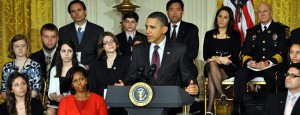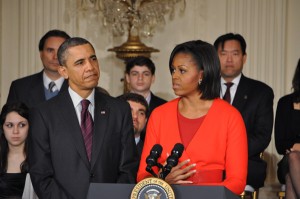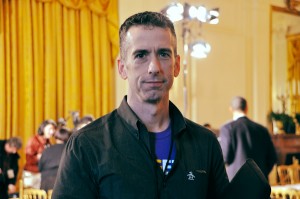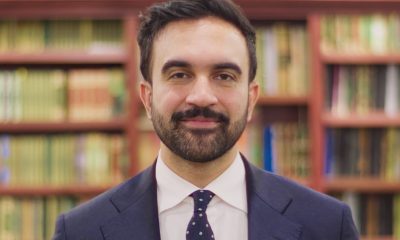National
White House hosts anti-bullying conference
Obama unveils stopbullying.gov as resource to address harassment

President Obama on Thursday opened the doors of the White House to anti-bullying advocates for a conference in which participants discussed harassment of students and devised strategies to curtail bullying.
In remarks starting off the conference, Obama said if the conference had one goal, it would be dispel the myth that bullying is “a harmless rite of passage or an inevitable part of growing up.”
“It’s not,” he said. “Bullying can have destructive consequences for our young people. And it’s not something we have to accept. As parents and students, as teachers and members of the community, we can take steps — all of us — to help prevent bullying and create a climate in our schools in which all of our children can feel safe; a climate in which they all can feel like they belong.”
The conference, in which around 150 students, parents, teachers and anti-bullying advocates participated, wasn’t specifically directed toward the bullying of LGBT students, although harassment of children because of their sexual orientation or gender identity was often mentioned.
Bullying against LGBT students received renewed attention late last year when several young men who were gay or perceived to be gay took their own lives after they were reportedly bullied. Among them was Tyler Clementi, a Rutgers University student, who leaped off the George Washington Bridge in September after a video was posted online of him reportedly having a sexual encounter with another man in his dorm room.
During his remarks, Obama noted that students who are gay are among the types of children who often face bullying at school.
“A third of middle school and high school students have reported being bullied during the school year,” Obama said. “Almost 3 million students have said they were pushed, shoved, tripped, even spit on. It’s also more likely to affect kids that are seen as different, whether it’s because of the color of their skin, the clothes they wear, the disability they may have, or sexual orientation.”
Obama also announced that his administration had launched a new website, stopbullying.gov, as a resource housed within the Department of Health & Human Services for parents, students and teachers on how to confront the issue of bullying in schools. The website is set to provide information on the risks of bullying and its warning signs and effects.
First lady Michelle Obama, who introduced the president at the start of the event, said the issue of bullying is personal for both her and her hisband because of their concern for their two daughters: Malia and Sasha.
“As parents, this issue really hits home for us,” she said. “As parents, it breaks our hearts to think that any child feels afraid every day in the classroom, or on the playground, or even online. It breaks our hearts to think about any parent losing a child to bullying, or just wondering whether their kids will be safe when they leave for school in the morning.”
Michelle Obama urged parents “to make a real effort to be engaged in our children’s lives” and to listen to them and be there when needed.
“We need to get involved in their schools and in their activities so that we know what they’re up to, both in and out of the classroom,” she said. “And when something is wrong, we need to speak up, and we need to take action.”
Following the president remarks, Valerie Jarrett, senior adviser to the president, led a panel discussion of anti-bullying experts to discuss ways that parents, administrators and government officials can work to curtail harassment of students.
Points that were mentioned included recommending that parents be friends with their children on Facebook for oversight purposes and how the behavior of those who perpetuate bullying must also be addressed as part of anti-bullying efforts.
After the panel, conference participants split into five break-out sessions for more extensive debate on particular issues related to bullying. Topics of the breakout session included cyberbullying and in-school programs to confront bullying.
Top Obama administration officials during a wrap-up session at the close of the conference emphasized the support that anti-bullying advocates have in the White House.
Education Secretary Arne Duncan announced a new initiative — a technical assistance center — which would specifically address harassment to complement anti-bullying efforts that are already underway.
“By trying to highlight these best practices, we will state and local policy makers and educators work to keep children safe and provide the best learning environment for all students,” Duncan said. “We can provide support, which is why I’m happy to announce today our department’s intention to establish a new technical assistance center specifically dedicated to bullying prevention.”
Secretary of Health & Human Services Kathleen Sebelius urged teachers and others to speak out when anti-gay slurs are used in schools.
“Building safe neighborhoods and schools where young people can thrive is a job for all of us,” Sebelius said. “It means speaking out next time you hear a homophobic slur, stepping in when you see someone being preyed upon and letting your local education leaders — from principals to schools — know that bullying is not an isolated part of growing up. It’s a serious danger for all of our children.”
Participants had a largely positive reaction to the event and thought it was productive in devising strategies to thwart bullying.
In a statement, Jeff Krehely, director of the LGBT research and communications project at the Center for American Progress, said the conference “put a national spotlight” on bullying and its potentially “destructive impact.”
“Although the event is born out of tragedies, the conference will hopefully spark a robust national discussion about what we can all do to stop this problem,” Krehely said. “With an increase in bullying and full-on assaults on youth who are perceived to be gay or transgender, as well as those who are perceived to be Muslim, now is the right time to show leadership on this issue.”
Caleb Laiseki, executive director of the Arizona-based Gays & Lesbians United Against Discrimination, said the conference was “much more productive” than he expected.
“I’m coming from Arizona, and Arizona can’t even pass the anti-bullying bill through committee, so I was extremely happy to see the White House was very dedicated to this,” Laiseki said.
Laiseki, who’s 16 and gay, dropped out of high school after he was bullied because of his sexual orientation and completed his education by earning a general equivalency diploma. He founded GLUAD to help address the problems he faced in school.
“The reason I started the organization was because I was pushed into lockers and humiliated,” he said. “I received death threats [and was] followed home. It was just one thing after another. And I also had friend commit suicide after several attempts. So, the main goal of GLAUD is homelessness, suicide prevention and anti-bullying work.”
Laiseki attended the breakout session focused on cyber-bullying and said he proposed that law enforcements have the tools to intervene immediately when such harassment takes place.
“We can immediately track down the [Internet protocol] address and go from there,” Laiseki said. “And both of the representatives [from the Obama administration] were in agreement. And we took notes actually and discussed it for at least one-third of the meeting.”
Dan Savage, founder of the “It Gets Better” online video campaign aimed at helping troubled LGBT teens, said the conference was of “tremendous symbolic importance” because it identified bullying as a national problem, but said more could be done with the issue of parents being the bullies of LGBT youth.
“What was never addressed is when the parents are the bullies,” Savage said. “LGBT kids whose parents reject them are eight times likelier to attempt suicide; kids who are LGBT are four times. It literally doubles the risk of the already quadrupled risk of suicide for LGBT kids when their families reject them.”
Legislation pending before Congress known as the Student Non-Discrimination Act and the Safe Schools Improvement Act would address the issue of LGBT bullying of students in schools. Savage, who’s gay and also a sex-advice columnist, said the passage of this legislation would be effective.
“It puts schools on notice,” Savage said. “It establishes a national sense of accountability. Schools are reactive. They don’t like to be sued. They don’t like to get in trouble with the folks that pay the bills — at the federal or state level — and it really creates a way for school administrators and school boards to be held accountable.”
Shannon Cuttle, director of Safe Schools Action Network, said she felt the event was effective because it drew more attention to the issue of bullying.
“I think that anytime that you can collectively get a group of people to work in collaboration to try to discuss this issue, it’s going to put a dent in the issue,” Cuttle said. “Today is making the right step. Being able to bring people from across America — teachers, administrators, individuals and students — that’s key.”
But Cuttle, a lesbian D.C. activist, said the best way to address the issue of bullying in schools to confront harassment with “boots on the ground.”
“We have to be able to go into the schools, we have to have conversations and we have to be able to discuss the issue,” she said. “We have to be able to have those honest, open conversations with teachers and school administrators, and as parents and students, we need to talk to our school boards and local officials and be able to put rules and policies in place to keep kids safe.”
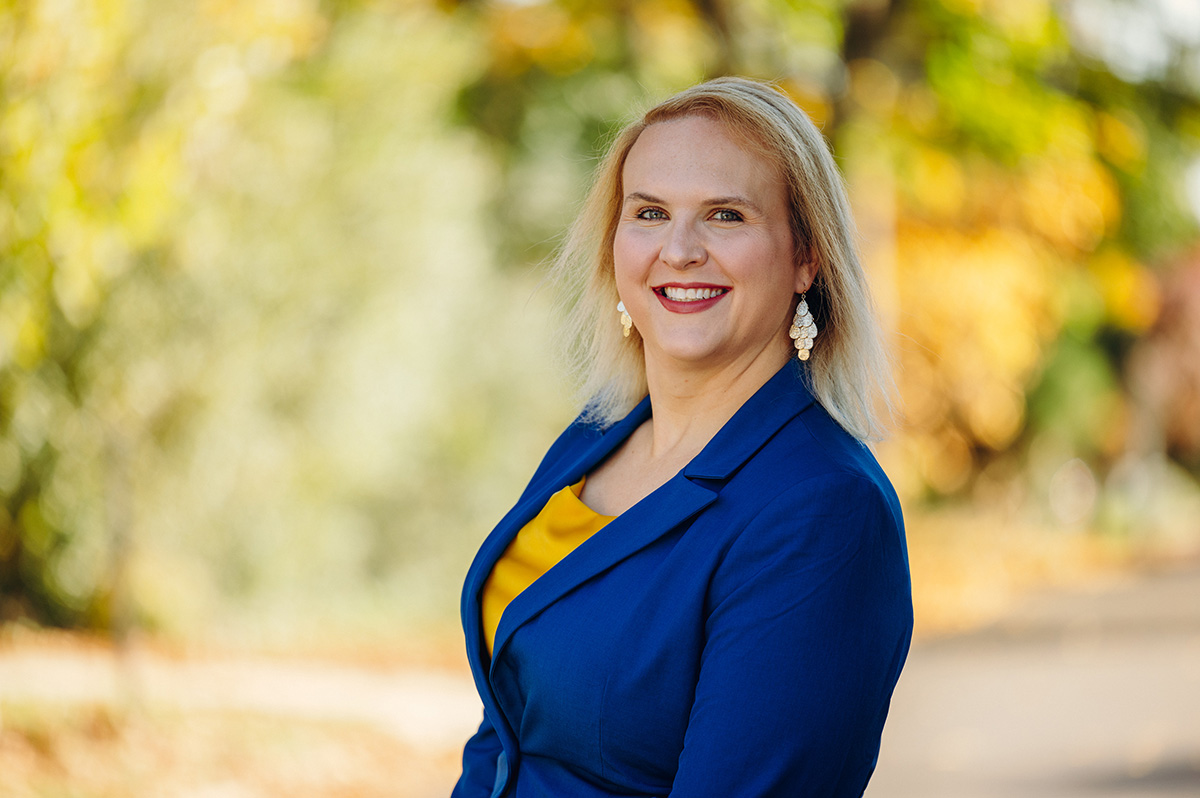
Erica Deuso will become the first openly transgender mayor in Pennsylvania.
Voters in Downingtown elected Deuso on Tuesday with 64 percent of the vote, according to the Philadelphia Inquirer. The Democrat ran against Republican Richard Bryant.
Deuso, 45, currently works at Johnson & Johnson and has lived in Downingtown since 2007. The mayor-elect is originally from Vermont and graduated from Drexel University.
Deuso released a statement following her election, noting that “history was made.”
“Voters chose hope, decency, and a vision of community where every neighbor matters,” Deuso stated. “I am deeply honored to be elected as Pennsylvania’s first openly transgender mayor, and I don’t take that responsibility lightly.”
According to a LGBTQ+ Victory Institute report released in June, the U.S. has seen a 12.5 percent increase in trans elected officials from 2024 to 2025. Still, Deuso’s campaign did not heavily focus on LGBTQ policy or her identity. She instead prioritized public safety, environmental resilience, and town infrastructure, according to Deuso’s campaign website.
Deuso has served on the boards of the Pennsylvania Equality Project, PFLAG West Chester/Chester County, and Emerge Pennsylvania, according to the LGBTQ+ Victory Fund. She is also an executive member of the Chester County Democratic Committee.
“This victory isn’t about one person, it’s about what happens when people come together to choose progress over fear. It’s about showing that leadership can be compassionate, practical, and focused on results. Now the real work begins, building a Downingtown that is safe, sustainable, and strong for everyone who calls it home,” Deuso said.
Downingtown has a population of more than 8,000 people and is a suburb of Philadelphia. The town’s current mayor, Democrat Phil Dague, did not seek a second term.
Janelle Perez, the executive director of LPAC, celebrated Deuso’s victory. The super PAC endorses LGBTQ women and nonbinary candidates with a commitment to women’s equality and social justice, including Deuso.
“Downingtown voters delivered a resounding message today, affirming that Erica represents the inclusive, forward-looking leadership their community deserves, while rejecting the transphobic rhetoric that has become far too common across the country,” Perez said. “Throughout her campaign, Erica demonstrated an unwavering commitment to her future constituents and the issues that matter most to them. LPAC is proud to have supported her from the beginning of this historic campaign, and we look forward to the positive impact she will have as mayor of Downingtown.”
Deuso will be sworn in as mayor on Jan. 7.
U.S. Supreme Court
LGBTQ legal leaders to Supreme Court: ‘honor your precedent, protect our families’
Experts insist Kim Davis case lacks merit
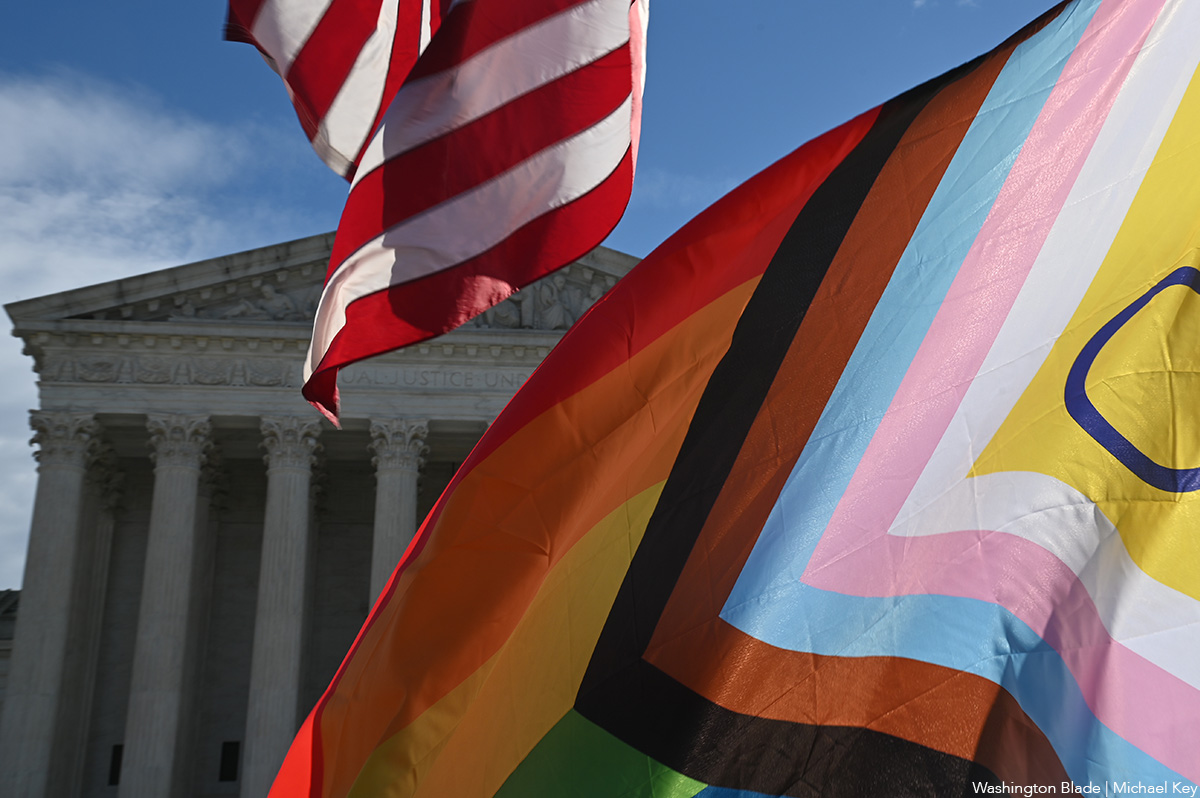
The U.S. Supreme Court considered hearing a case from Kim Davis on Friday that could change the legality of same-sex marriage in the United States.
Davis, best known as the former county clerk for Rowan County, Ky., who defied federal court orders by refusing to issue marriage licenses to same-sex couples — and later, to any couples at all — is back in the headlines this week as she once again attempts to get Obergefell v. Hodges overturned on a federal level.
She has tried to get the Supreme Court to overturn this case before — the first time was just weeks after the initial 2015 ruling — arguing that, in her official capacity as a county clerk, she should have the right to refuse same-sex marriage licenses based on her First Amendment rights. The court has emphatically said Davis, at least in her official capacity as a county clerk, does not have the right to act on behalf of the state while simultaneously following her personal religious beliefs.
The Washington Blade spoke with Karen Loewy, interim deputy legal director for litigation at Lambda Legal, the oldest and largest national legal organization advancing civil rights for the LGBTQ community and people living with HIV through litigation, education, and public policy, to discuss the realistic possibilities of the court taking this case, its potential implications, and what LGBTQ couples concerned about this can do now to protect themselves.
Loewy began by explaining how the court got to where it is today.
“So Kim Davis has petitioned the Supreme Court for review of essentially what was [a] damages award that the lower court had given to a couple that she refused a marriage license to in her capacity as a clerk on behalf of the state,” Loewy said, explaining Davis has tried (and failed) to get this same appeal going in the past. “This is not the first time that she has asked the court to weigh in on this case. This is her second bite at the apple at the U.S. Supreme Court, and in 2020, the last time that she did this, the court denied review.”
Davis’s entire argument rests on her belief that she has the ability to act both as a representative of the state and according to her personal religious convictions — something, Loewy said, no court has ever recognized as a legal right.
“She’s really claiming a religious, personal, religious exemption from her duties on behalf of the state, and that’s not a thing.”
That, Loewy explained, is ultimately a good thing for the sanctity of same-sex marriage.
“I think there’s a good reason to think that they will, yet again, say this is not an appropriate vehicle for the question and deny review.”
She also noted that public opinion on same-sex marriage remains overwhelmingly positive.
“The Respect for Marriage Act is a really important thing that has happened since Obergefell. This is a federal statute that mandates that marriages that were lawfully entered, wherever they were lawfully entered, get respect at the federal level and across state lines.”
“Public opinion around marriage has changed so dramatically … even at the state level, you’re not going to see the same immediate efforts to undermine marriages of same-sex couples that we might have a decade ago before Obergefell came down.”
A clear majority of U.S. adults — 65.8 percent — continue to support keeping the Obergefell v. Hodges decision in place, protecting the right to same-sex marriage. That support breaks down to 83 percent of liberals, 68 percent of moderates, and about half of conservatives saying they support marriage equality. These results align with other recent polling, including Gallup’s May 2025 estimate showing 68 percent support for same-sex marriage.
“Where we are now is quite different from where we were in terms of public opinion … opponents of marriage equality are loud, but they’re not numerous.”
Loewy also emphasized that even if, by some chance, something did happen to the right to marry, once a marriage is issued, it cannot be taken back.
“First, the Respect for Marriage Act is an important reason why people don’t need to panic,” she said. “Once you are married, you are married, there isn’t a way to sort of undo marriages that were lawfully licensed at the time.”
She continued, explaining that LGBTQ people might feel vulnerable right now as the current political climate becomes less welcoming, but there is hope — and the best way to respond is to move thoughtfully.
“I don’t have a crystal ball. I also can’t give any sort of specific advice. But what I would say is, you know, I understand people’s fear. Everything feels really vulnerable right now, and this administration’s attacks on the LGBTQ community make everybody feel vulnerable for really fair and real reasons. I think the practical likelihood of Obergefell being reversed at this moment in time is very low. You know, that doesn’t mean there aren’t other, you know, case vehicles out there to challenge the validity of Obergefell, but they’re not on the Supreme Court’s doorstep, and we will see how it all plays out for folks who feel particularly concerned and vulnerable.”
Loewy went on to say there are steps LGBTQ couples and families can take to safeguard their relationships, regardless of what the court decides. She recommended getting married (if that feels right for them) and utilizing available legal tools such as estate planning and relationship documentation.
“There are things, steps that they can take to protect their families — putting documentation in place and securing relationships between parents and children, doing estate planning, making sure that their relationship is recognized fully throughout their lives and their communities. Much of that is not different from the tools that folks have had at their disposal prior to the availability of marriage equality … But I think it behooves everyone to make sure they have an estate plan and they’ve taken those steps to secure their family relationships.”
“I think, to the extent that the panic is rising for folks, those are tools that they have at their disposal to try and make sure that their family and their relationships are as secure as possible,” she added.
When asked what people can do at the state and local level to protect these rights from being eroded, Loewy urged voters to support candidates and initiatives that codify same-sex marriage at smaller levels — which would make it more difficult, if not impossible, for a federal reversal of Obergefell to take effect.
“With regard to marriage equality … states can be doing … amend state constitutions, to remove any of the previous language that had been used to bar same-sex couples from marrying.”
Lambda Legal CEO Kevin Jennings echoed Loewy’s points in a statement regarding the possibility of Obergefell being overturned:
“In the United States, we can proudly say that marriage equality is the law,” he said via email. “As the Supreme Court discusses whether to take up for review a challenge to marriage equality, Lambda Legal urges the court to honor what millions of Americans already know as a fundamental truth and right: LGBTQ+ families are part of the nation’s fabric.
“LGBTQ+ families, including same-sex couples, are living in and contributing to every community in this country: building loving homes and small businesses, raising children, caring for pets and neighbors, and volunteering in their communities. The court took note of this reality in Obergefell v. Hodges, citing the ‘hundreds of thousands of children’ already being raised in ‘loving and nurturing homes’ led by same-sex couples. The vows that LGBTQ+ couples have taken in their weddings might have been a personal promise to each other. Still, the decision of the Supreme Court is an unbreakable promise affirming the simple truth that our Constitution guarantees equal treatment under the law to all, not just some.”
He noted the same things Loewy pointed out — namely that, at minimum, the particular avenue Davis is attempting to use to challenge same-sex marriage has no legal footing.
“Let’s be clear: There is no case here. Granting review in this case would unnecessarily open the door to harming families and undermine our rights. Lower courts have found that a government employee violates the law when she refuses to grant marriage licenses to same-sex couples as her job requires. There is no justifiable reason for the court to revisit settled law or destabilize families.”
He also addressed members of the LGBTQ community who might be feeling fearful at this moment:
“To our community, we say: this fight is not new. Our community has been fighting for decades for our right to love whom we love, to marry and to build our families. It was not quick, not easy, not linear. We have lived through scary and dark times before, endured many defeats, but we have persevered. When we persist, we prevail.”
And he issued a direct message to the court, urging justices to honor the Constitution over one person’s religious beliefs.
“To the court, we ask it to honor its own precedent, to honor the Constitution’s commands of individual liberty and equal protection under the law, and above all, to honor the reality of LGBTQ families — deeply rooted in every town and city in America. There is no reason to grant review in this case.”
Kenneth Gordon, a partner at Brinkley Morgan, a financial firm that works with individuals and couples, including same-sex partners, to meet their legal and financial goals, also emphasized the importance of not panicking and of using available documentation processes such as estate planning.
“From a purely legal standpoint, overturning Obergefell v. Hodges would present significant complications. While it is unlikely that existing same-sex marriages would be invalidated, particularly given the protections of the 2022 Respect for Marriage Act, states could regain the authority to limit or prohibit future marriage licenses to same-sex couples. That would create a patchwork of laws across the country, where a couple could be legally married in one state but not recognized as married if they moved to or even visited another state.
“The legal ripple effects could be substantial. Family law issues such as adoption, parental rights, inheritance, health care decision-making, and property division all rely on the legal status of marriage. Without uniform recognition, couples could face uncertainty in areas like custody determinations, enforcement of spousal rights in medical emergencies, or the ability to inherit from a spouse without additional legal steps.
“Courts generally strive for consistency, and creating divergent state rules on marriage recognition would reintroduce conflicts that Obergefell was intended to resolve. From a legal systems perspective, that inconsistency would invite years of litigation and impose significant personal and financial burdens on affected families.”
Finally, Human Rights Campaign President Kelley Robinson issued a statement about the possibility of the Supreme Court deciding to hear Davis’s appeal:
“Marriage equality isn’t just the law of the land — it’s woven into the fabric of American life,” said Robinson. “For more than a decade, millions of LGBTQ+ couples have gotten married, built families, and contributed to their communities. The American people overwhelmingly support that freedom. But Kim Davis and the anti-LGBTQ+ extremists backing her see a cynical opportunity to attack our families and re-litigate what’s already settled. The court should reject this paper-thin attempt to undermine marriage equality and the dignity of LGBTQ+ people.”
U.S. Supreme Court
Supreme Court rules White House can implement anti-trans passport policy
ACLU, Lambda Legal filed lawsuits against directive.

The U.S. Supreme Court on Thursday said the Trump-Vance administration can implement a policy that bans the State Department from issuing passports with “X” gender markers.
President Donald Trump once he took office signed an executive order that outlined the policy. A memo the Washington Blade obtained directed State Department personnel to “suspend any application where the applicant is seeking to change their sex marker from that defined in the executive order pending further guidance.”
The White House only recognizes two genders: male and female.
The American Civil Liberties Union in February filed a lawsuit against the passport directive on behalf of seven trans and nonbinary people.
A federal judge in Boston in April issued a preliminary junction against it. A three-judge panel on the 1st U.S. Circuit Court of Appeals in September ruled against the Trump-Vance administration’s motion to delay the move.
A federal judge in Maryland also ruled against the passport policy. (Lambda Legal filed the lawsuit on behalf of seven trans people.)
“This is a heartbreaking setback for the freedom of all people to be themselves, and fuel on the fire the Trump administration is stoking against transgender people and their constitutional rights,” said Jon Davidson, senior counsel for the ACLU’s LGBTQ and HIV Project, in a statement. “Forcing transgender people to carry passports that out them against their will increases the risk that they will face harassment and violence and adds to the considerable barriers they already face in securing freedom, safety, and acceptance. We will continue to fight this policy and work for a future where no one is denied self-determination over their identity.”
Justices Ketanji Brown Jackson, Elena Kagan, and Sonia Sotomayor dissented.
The Supreme Court ruling is here.
-

 District of Columbia4 days ago
District of Columbia4 days ago‘Sandwich guy’ not guilty in assault case
-

 Sports4 days ago
Sports4 days agoGay speedskater racing toward a more inclusive future in sports
-

 New Jersey5 days ago
New Jersey5 days agoBlue wave hits Northeast: Sherrill and Mamdani lead Democratic comeback
-

 District of Columbia5 days ago
District of Columbia5 days agoTrial begins for man charged with throwing sandwich at federal agent

